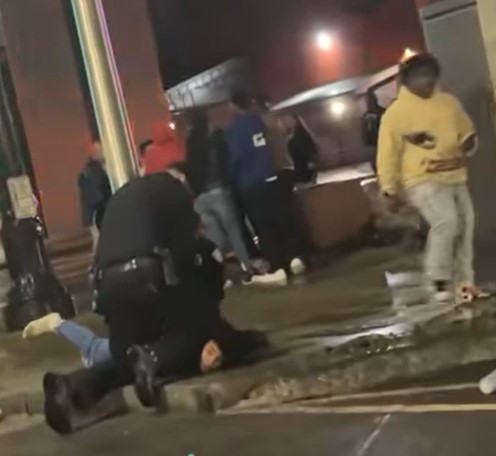Circulating videos of a Binghamton Police Department (BPD) officer kneeling on the neck of a Black-Asian man have sparked an investigation.
The incident took place outside of Dillinger’s Celtic Bar and Eatery — an Irish pub located on State Street — on Jan. 1 at approximately 3:19 a.m., according to a statement Binghamton Mayor Jared Kraham shared with WBNG 12 News shortly after. Kraham confirmed the incident is currently under investigation, which includes the examination of body cameras.
In a video circulating Facebook, witnesses can be seen gathering around BPD Officer Brad Kaczynski, who is kneeling on the neck and back of 24-year-old Hamail Waddell of Binghamton. Waddell can be seen asking witnesses to “get [their] phones out,” before the video concludes with Waddell stating, “I can’t breathe.” According to a Joint Press Statement from nine separate activist groups — including the Binghamton Tenants Union (BTU), Justice and Unity for the Southern Tier (JUST) and Zero Hour Binghamton — Waddell “sustained injuries to his face, head, neck and back, and required stitches in his chin.” Waddell filed a complaint about the incident on Jan. 2.
Waddell was handcuffed prior to the maneuver under investigation, according to Salka Valerio, a community stakeholder and activist, and was charged on the scene for resisting arrest. In an open letter written by Valerio, she said Waddell was “unfairly charged with resisting arrest,” and that Kaczynski should be held responsible for the incident.
“We have a shared responsibility for ensuring that every person is treated with humanity and basic dignity,” Valerio wrote. “When someone violates this fundamental value, there must be accountability. Without it, we are saying that actions that intentionally cause harm and put people’s lives at risk are okay.”
In the Joint Press Statement, the activist groups argued that the kneel displayed by Kaczynski reflects the one used on George Floyd in May of 2020 and violates the Eric Garner Anti-Chokehold Act, which — as the bill reads — “establishes criminal penalties for the use of a chokehold.” The organizations also claim the restraint used on Waddell breaches the BPD Use of Force Policy, which requires officers to only use force that is “objectively reasonable and appears necessary.”
These organizations expressed disappointment toward the BPD in lieu of recent “historic” events regarding “police brutality.”
“Hundreds gave feedback in public meetings, demanding that police power be constrained, oversight increased, and portions of their budgets reallocated to things like housing, mental health services, and youth programs,” the Joint Press Statement reads. “Yet political leaders have steadfastly refused even to consider making any substantive changes to policing.”
On Jan. 6, the BPD released a statement saying they assigned Kaczynski to desk duty, according to WBNG. The BPD did not reply to Pipe Dream’s request for comment.
Iris DeFino, the social media and public relations manager for JUST — an activist group against mass incarceration — and a sophomore majoring in political science, said she believes the “unjust and excessive violence” displayed by the BPD officer is reflective of “greater injustices” within the U.S. legal system.
“I am always so frustrated at the fact that the very institutions and officers that are to ‘protect and serve’ are the ones inflicting such injustice, harm and violence against our communities,” DeFino wrote in an email. “Time and time again, Americans have witnessed the abhorrent behavior of police officers with little to no accountability or action on behalf of the institution itself. Police brutality often overlaps with racism and the hyper-criminalization and profiling of BIPOC communities, and this case is no exception.”
Alexander Gore, a junior double-majoring in political science and Spanish, also expressed concern regarding the U.S. legal system. Gore said he recognizes that not all police are “bad apples,” but he expressed concern about the “institutionalized violence” shown by the police force. Gore further feels the police force in New York state is no exception to his concern.
“I don’t know how many examples it has to take to show that there is a problem of institutional violence within the [U.S.] police force,” Gore said. “We think we live in such a harmonious state here in New York, but even here things like this happen. I think it’s pretty awful and my full support goes out to [Waddell] and his family.”



